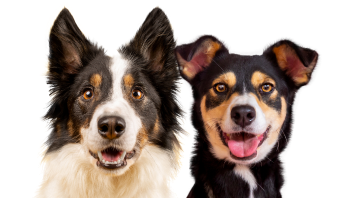Dog Food Calculator
DogFoodAdvisor is reader supported See how
Dog Food Advisor is 100% impartial and is never paid to promote any brand. But if you buy using links on this page, we may earn a referral fee.
The Dog Food Calculator can help you estimate the proper serving size for your pet. It’s based upon a study published by the respected Waltham Centre for Pet Nutrition in Leicestershire, England. 1
To use the calculator, you’ll need to know your dog’s ideal weight. This is what you believe your pet should weigh.
You’ll also need to know the number of calories in the specific dog food you’re feeding him.
The calculator’s formula2 uses a dog’s metabolic weight to suggest an approximate serving size.
Dog Food Calculator Guidelines
The Dog Food Calculator was designed for adult dogs only… not for puppies.
And it should never be used for pregnant or lactating females.
Small breeds are considered adults at about 9 to 12 months of age. And medium breeds at about 12 to 14 months.3
However, large and giant breeds shouldn’t be fed as adults until they reach around 1 to 2 years — depending upon the breed.4
Overweight Dogs
If you believe your dog might be overweight, be sure to choose the “Overweight” option for “Your dog’s activity level”.
Otherwise, the recommended serving size will likely be too high.
And for help, be sure to visit our Best Dog Foods for Weight Loss article.
Senior Dogs
Older dogs have significantly lower energy needs than younger ones. So, it’s easy for them to put on extra weight.
In general, small to medium dogs are considered seniors at about seven years of age. However, larger breeds reach senior status much sooner — some as early as five.5
Converting From Calories to Serving Size
Once you’ve entered your dog’s ideal weight and activity level, you’ll know the number of calories per day.
However, to convert calories into something you can use, you’ll need to enter the number of calories in your dog’s food.
The number of calories in a given amount of dog food is known as its metabolizable energy (ME, for short). It’s usually reported somewhere on a dog food package like this…
- Calories per cup (kcal/cup)
- Calories per kilogram (kcal/kilogram)
By the way, the calculator assumes you’re feeding your dog just once a day.
If you prefer to feed your dog twice a day, be sure to divide your result in half so that both meals add up to the full daily calories suggested.
The Bottom Line
Since every dog is unique, it’s impossible to predict the serving size that’s perfect for each pet.
So, start with the package’s feeding instructions — or the amount suggested by our calculator.
And be sure to weigh your dog every few weeks.
Then, simply adjust that suggested serving size up or down to reach and maintain your pet’s ideal weight.
Final word
The Dog Food Advisor does not accept money, gifts, samples or other incentives in exchange for special consideration in preparing our reviews.
However, we do receive a referral fee from online retailers (like Chewy or Amazon) and from sellers of perishable pet food when readers click over to their websites from ours. This helps cover the cost of operation of our free blog. Thanks for your support.
For more information, please visit our Disclaimer and Disclosure page.





